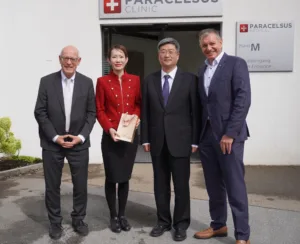Embracing Renewal: Spring Clean Your Life Inside and Out
And once again, spring arrives, allowing the perfect time to experience the many benefits of fasting. Springtime equals clean-up time. Therefore, it’s time to rid ourselves of old burdens and refresh our energy. Fasting isn’t just a way to cleanse the body, but also an effective method to kick-start your body’s regulation and regeneration, especially if some chronic illness burdens you.
Simply taking the step to withdraw, be mindful, focus on breathing, or engage in contemplation already leads to a reconnection with oneself, perhaps for the first time. Whether your health focus is on the mind, bones, muscles, stomach, or heart, fasting enables you to direct attention inward, where the potential for self-healing resides.
We humans are designed in such a way that we can easily sustain ourselves from within for an extended period. This even can have a substantial healing effect. Apparently, the body copes better with scarcity than with excess. With the help of a guided fasting program, you can more easily and more effectively “experience” these states of inner peace and wellbeing described above.
Fasting has a long tradition in Switzerland
Fasting has a long tradition in Europe, with Switzerland and other German-speaking countries playing a significant role in its development, particularly through the contributions of notable figures like Buchinger, Birchler, and Kneipp. For example, Dr. Maximilian Birchler, a Swiss naturopath, emphasized the importance of fasting for detoxification and rejuvenation of the body. His work helped popularize fasting as a holistic health practice in Switzerland and beyond. Similarly, one of the most influential figures in fasting history was Dr. Otto Buchinger, a German physician who pioneered therapeutic fasting in the early 20th century. His method, known as the Buchinger fasting therapy, focuses on water fasting combined with the intake of vegetable broth, fruit juices, and herbal teas. Buchinger’s approach gained widespread recognition for its effectiveness in treating various chronic diseases and promoting overall well-being.
Fasting offers a variety of potential medical benefits, based on many studies, including the work of Dr. Longo:
1. Fasting can reset the immune system
Fasting reboots the immune system, as it puts the body into a state of regeneration and repair. During fasting, old and damaged cells are broken down, a process known as autophagy, and new cells are generated through processes such as stem cell activation and proliferation. This process can help renew and strengthen the immune system by sorting out old or faulty immune cells and replacing them with fresh, functional cells.
Fasting and immune function:
A study from 2014, published in the journal “Cell Stem Cell,” found that fasting can promote the regeneration of the immune system in mice. The researchers observed that fasting resulted in the breakdown of old and damaged immune cells, which were replaced by new, healthy cells, leading to improved immune function (1).
2. Cardiovascular Health
Studies show that intermittent fasting can reduce the risk of cardiovascular diseases by lowering blood pressure, regulating cholesterol levels, and improving heart health.
3. Anti-inflammatory Effects
Fasting can reduce inflammation in the body, thereby reducing the risk of chronic diseases such as arthritis, diabetes, and cancer.
4. Improved Insulin Sensitivity
Fasting can improve insulin sensitivity, helping to regulate blood sugar levels and reduce the risk of type 2 diabetes.
5. Cellular Regeneration and Repair
Fasting promotes autophagy, the process described earlier, in which cells break down and recycle damaged or no longer needed components. This can help rejuvenate cells and reduce the risk of age-related diseases.
6. Mental Clarity and Cognitive Function:
Many people report increased mental clarity, improved concentration, and enhanced cognitive performance during fasting.
7. Weight Management:
Especially intermittent fasting can effectively aid in weight loss by improving metabolism, promoting fat burning, and reducing hunger.
8. Improved Mood and Emotional Well-being:
Fasting can induce hormonal changes in the body that positively affect mood and reduce stress.
9. Fasting Leads to Better Treatment Outcomes:
Fasting can lead to better treatment outcomes, as the hypoglycemic effect induced by fasting “opens” cells and makes them more accessible for therapies such as vitamin C infusions. This is especially true for cells with high sugar metabolism (including cancer cells) (2).
Fasting is very individual, we prioritize mindful fasting
Even in the world of fasting, there are a wide variety of approaches and methods, but at the Paracelsus Clinic Lustmühle, we view fasting as a mindful practice. For us, it’s not just about losing weight or detoxifying the body, but rather about achieving comprehensive healing and regeneration on all levels. Our holistic approach encompasses a variety of programs aimed at cleansing not only the body but also the mind and soul. From traditional juice fasting to more advanced colon cleansing programs, we offer a range of options for our patients.
One of our most prominent programs is the 6-Day Biofilm & Parasite Fasting Program, specifically designed to cleanse the body of the harmful biofilm and promote inner health. Additionally, we also offer our proven 7-Day Liver Detoxification Program, which aims to support and improve the function of this vital organ.
Paracelsus Mind-Body Medicine: Transformation Through Fasting
The kind of fasting that just eliminates food in the midst of our fast pace daily life, between work, family, and leisure should be discouraged. It’s worthwhile to take a break and reduce external stimuli during fasting. This includes “digital detox” as well.
Holistic fasting involves the body, mind, and soul. During fasting, the body undergoes a temporary transformation as the mind has to process and integrate this shift. Whether it’s meditation, or consciously experiencing one’s thoughts, mindfulness interventions support all emotional experiences while fasting especially dealing with hunger cravings which often accompany fasting. The focus is on the body and the sensations triggered by abstaining from food.
Of course, fasting can also be done without spirituality. But why not take advantage of the opportunity to use the abstaining from food to improve mental wellbeing like reduced anxiety, perceived stress and increase mindfulness awareness and resilience.
Paracelsus Provides Professional Care During Fasting
It is important to note that fasting without any kind of solid food is not suitable for everyone and that individual needs and health conditions must be considered. It is recommended to consult a Biological Medicine physician before starting a fasting program, especially for individuals with existing health problems.
With the expertise of our physicians, nutritionists, and therapists, we provide comprehensive care aimed at addressing the individual needs and health goals.
We understand that each person is unique and has different health concerns. Therefore, we offer a variety of fasting options and complementary therapies, including Mind-Body Medicine and Psycho-Kinesiology, to meet the needs of each individual.
Especially for people with chronic illnesses, it is important to us that their symptoms do not worsen before they improve. For this reason, we place great emphasis on monitoring the progress during fasting. We observe and give therapies to replenish nutrients and carefully adjust the program if needed to ensure that our patients receive the best possible support and care as they journey towards health and well-being.
Fasting with Us: Overview of Procedure, Content, Recipes
From the many types of fasting programs available, such as Buchinger fasting, juice fasting, water/tea fasting, alkaline fasting, FX Mayr fasting, and Ayurvedic fasting, we at Paracelsus Clinic have various options including our Paracelsus Detox Fasting Program which is the result of many years of experience mostly by combining our Paracelsus Elimination diet and Hypoallergenic diet.
We aim for the following:
- Reducing inflammation
- Promoting an alkaline body environment
- Relieving the immune system and the gut
- Regeneration and rebuilding of cells and organs
- 2 – 3 days of preparation
- 5 – 10 days of fasting
- 3 – 5 days of transitioning back to regular eating

Preparation for Fasting
Especially in the first three days, the body adapts and lives from its reserves. Fat is broken down and “toxins” are also released from the connective tissue. This can lead to unpleasant side effects such as headaches, low blood pressure, skin reactions, lethargy, sleep disorders and bad moods.
It can be very exhausting to deprive the body of food. Moments of craving for cake, cheese, pasta etc. will come all at once and turn your thoughts to “getting weak”. Before you reach for the food here, you should pause for a moment and feel yourself or dance, breathe and, above all, remain steadfast.
It’s actually just habits and cravings.
Pausing and awareness bring about clarity and strength of will. Always remember that cravings and hunger pangs are short-lived and disappear as quickly as they came.
Mental Preparation
During fasting, the aim is to relax, let go and release. However, if you are stressed, the opposite happens, namely you are stressed, tense and hold on. As a result, it becomes difficult to let go, both physically and mentally.
For healing and well-being, it is essential to shift our focus from the dominance of the mind back to the ease of simply being. We have indeed degenerated, worsening from generation to generation, when it comes to the ability to feel at ease with our bodies, let alone listen to our hearts or trust our guts. As Hildegard von Bingen said, ‘The soul is the mistress, the flesh is the servant.’ She also knew that fasting could heal 29 out of the 35 ‘vices,’ as she called them—the patterns of disease on all levels. Everyone has weaknesses and can progress at their own pace, and that’s okay. What’s important is to recognize it and increase self-awareness.
Practical Preparation
It is a good idea to go shopping in advance for the following so you won’t have to go to any stores during your fast:
- Plenty of pure water
- Various herbal teas (kidney tea, liver-gallbladder tea)
- If necessary, fruits for smoothies, vegetables for smoothies and broth
- Alkaline bath salts for a long-time baths or foot baths
- Dry brush for dry brushing
- Hot water bottle
- If necessary, equipment for an enema e.g. Klyso Pump or intestinal flush irrigator
- If necessary, fermented plums
If you’re someone who enjoys snacking, stop this habit at least one week beforehand and reduce your meals to a maximum of three per day. Have an affirmation ready for this as well as keep your goal in mind. You may even start with intermittent fasting and only have a light lunch and dinner.
Fasting Days
Especially in the first three days, the body undergoes a transition and relies on its reserves. Fat is broken down, and “toxins” are released from the connective tissue. This can lead to unpleasant side effects such as headaches, low blood pressure, skin reactions, lethargy, sleep disturbances, and bad mood.
It can be very challenging to withhold food from the body. Moments of craving for cake, cheese, pasta, etc., may arise suddenly and distract thoughts towards “giving in.” Before reaching for food, one should pause briefly, be mindful of what you feel, breathe, and above all, remain steadfast. We have many Mind Body Medicine tools to help you in this regard.
Actually, in the end it’s just habits and cravings.
Being in the present moment brings clarity and willpower. Always keep in mind that cravings and hunger pangs are only temporary and will disappear as quickly as they came.

Breaking the Fast
Breaking the Fast:
Breaking the fast, in my opinion, is the most challenging aspect of fasting. In my favourite fasting guide, I found the following saying: “Anyone can fast, but breaking the fast; that is the ultimate success and challenge of fasting.” The rebuilding phase begins after breaking the fast, requiring further discipline to avoid falling into an “eating trap”.
Therefore, it is extremely helpful to train your mind, to be conscious and disciplined. It is also helpful to get professional guidance and somebody who can support and motivate you to persevere. Here at our clinic, we offer professional nutritional support, mind-body therapy, rebuilding infusions, and colon hydrotherapy among others, which assures optimal health benefits and a best possible fasting experience. Especially with colon hydrotherapy, I find it fascinating to see what can still be flushed out despite fasting.
So, seize the opportunity to fast and experience a summer with newfound vitally, energy and health.
References:
- Cheng CW et al. Prolonged fasting reduces IGF-1/PKA to promote hematopoietic-stem-cell-based regeneration and reverse immunosuppression. Cell 2 Stem Cell. 2014; Jun 5;14(6):810-23.
- Seyfried, T.N., Shelton, L.M. Cancer as a metabolic disease. 2010; Nutr Metab (Lond) 7, 7.




